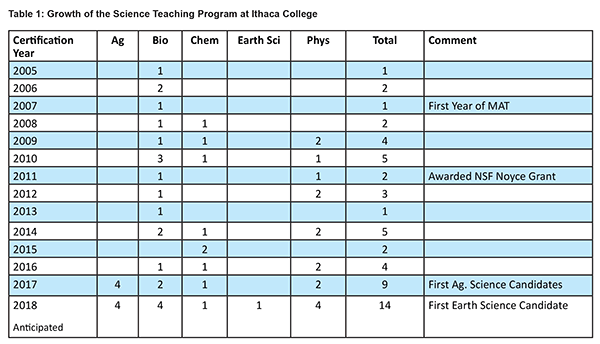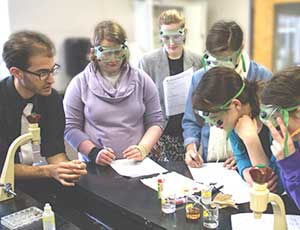Ithaca College Physics/Science Teacher Certification Program
Michael “Bodhi” Rogers, Ithaca College
The Ithaca College Master of Art in Teaching (MAT) program is a 13-month-long, 36-credit pathway to New York State (NYS) teaching certification in agricultural science, biology, chemistry, earth science, English, French, mathematics, physics, or Spanish. Prior to enrollment in our MAT program, teacher candidates complete an undergraduate degree in their certification area, a year of a foreign language, educational psychology, social and cultural foundations of education, and an early field experience that includes 50 hours of fieldwork in a classroom setting. All of our ~20 MAT candidates are enrolled together in courses covering educational technology, foundations of literacy, inclusive teaching practices, language acquisition, and general pedagogy and practices. Each disciplinary area has an additional pedagogy and practices course (all of our science students are grouped together in the same course). Our biology, chemistry, earth science, and physics candidates also take courses on inquiry and the nature of science, science topics every science teacher should know, and research for the science teacher. Similarly, our agriculture science candidates take additional courses on educational programs in agricultural science, youth leadership and organizations, and advanced concepts in agricultural education.
While we do offer undergraduate pathways for our students to become certified in four years (which require 120+ mostly proscribed credits), only one biology student has opted to pursue the undergraduate certification option. Through active advising we encourage our freshman science majors interested in becoming teachers to focus on their discipline area, minor in education, and then enter our MAT program. (There is evidence that extended programs result in better prepared teachers as compared to traditional 4-year-long certification programs.1) The Undergraduate Degree + MAT is also a viable pathway for science students who discover their passion for teaching later in their undergraduate careers. This most commonly happens through our undergraduate teaching assistant program.2
Our science teaching program has experienced a series of internal and external changes since adding the MAT option in 2007. During the summer of 2011, Ithaca College was awarded a National Science Foundation Robert Noyce Teaching Scholarship Program grant to support the recruitment and retention of high quality and diverse physics and mathematics teaching candidates, which we later expanded to include all science disciplines and STEM-focused childhood teaching candidates. From 2013 to 2014 Ithaca College went through its first national accreditation (NCATE / CAEP3) of its teacher certification programs, and we also responded to NYS’s requirement of edTPA4 assessment as part of certification. In 2013 Ithaca College, Cornell University, and the NYS Education Department worked together to create an agricultural certification program that is housed at Ithaca College but is also in collaboration with Cornell’s excellent agricultural program. In 2015 we formally added an MAT in Agricultural Teaching along with a new MAT pathway in earth science.
To facilitate entry into our MAT program, we formed an articulation agreement with Cornell that streamlines the admissions process when certain metrics are met. We have now expanded our articulation agreements to include Rochester Institute of Technology and the State University of New York (SUNY) at Cobleskill, and additional agreements are in the works with regional institutions that do not offer graduate certification programs.
The confluence of the NSF Noyce grant and our national accreditation provided us an opportunity to rethink the structure of our science teaching program. National accreditation required the restructuring of our curriculum to meet new standards, and the Noyce grant provided the financial means to try new ideas. We created three new graduate courses already mentioned: Inquiry and the Nature of Science, Science Topics every Science Teacher Should Know, and Research for the Science Teacher; as well as an undergraduate seminar: Linking Science Learning to Science Teaching, which is a review of the science education research literature with a focus on pedagogical content knowledge.5 Each fall the science teaching cohort attends the Science Teachers Association of NYS meeting; and during our teacher programs’ annual urban education field experience in NYC, the science candidates visit the American Museum of Natural History to explore the role museums play in education. In a model similar to PhysTEC,6,7 we now have retired-teachers-in-residence who assist with teaching courses, running Skype professional learning community8 meetings every other week for our pre-and in-service teachers, and accompanying Noyce scholars to professional conferences. Table 1 outlines how our science teaching program has grown from being a biology-focused program averaging one to two teaching candidates per year to a program that has teaching candidates in all of the science disciplines and averages two physics candidates per year.

Our graduate science teaching program has grown to be a robust program that creates a tight cohort of highly prepared science educators. Only one science candidate did not pass edTPA on the first try, and 53% achieve a score of mastery. All of our candidates who actively seek employment (some take a gap year) are teaching in the fall following their completion of our program. 70% of our students who became certified from 2005-2016 are still actively teaching, and 95% of our physics teachers are actively teaching (a 2016 graduate took a gap year and is now actively seeking employment).
With our 13-month-long teacher certification program having a track record of success, we are now looking at what elements of our program develop persistence in our candidates. Once our teaching candidates graduate, we have no control over their school district’s professional development and retention programs. Developing persistence in our candidates can help them succeed as teachers regardless of their school district’s retention programs. To support our in-service teachers, our Noyce grant provides resources for project staff to visit our in-service teachers’ classrooms to better understand what support they need, as well as resources for our in-service teachers to continue attending professional conferences and to participate in a summer teaching workshop held at Ithaca College.
This work was supported by the National Science Foundation DUE Award - 1136320.
Michael “Bodhi” Rogers is a professor in the Department of Physics & Astronomy. He is currently the coordinator of the science teaching program at Ithaca College. Along with being a physicist he is a registered professional archaeologist who specializes in geophysical archaeology and the use of laser scanning for historic preservation.
(Endnotes)
1. Linda Darling-Hammond, "How teacher education matters." Journal of Teacher Education 51.3 (2000): 166-173.
2. University of Colorado Learning Assistant Program - https://laprogram.colorado.edu
3. Council for the Accreditation of Educator Preparation (CAEP) - http://caepnet.org
4. edTPA - http://www.edtpa.com
5. Lee S. Shulman, "Those who understand: Knowledge growth in teaching." Educational Researcher 15.2 (1986): 4-14.
6. Rachel E. Scherr, Monica Plisch, and Renee Michelle Goertzen, "Sustaining programs in physics teacher education: A study of PhysTEC supported sites." (2014).
7. Mistilina Sato, "What is the underlying conception of teaching of the edTPA?." Journal of Teacher Education 65.5 (2014): 421-434.
8. Eugenia Etkina, "Pedagogical content knowledge and preparation of high school physics teachers." Physical Review Special Topics-Physics Education Research 6.2 (2010): 020110.

A Noyce Scholar, farthest left, during student teaching. This scholar was an Ithaca College undergraduate chemistry major who entered into our MAT program.
Disclaimer – The articles and opinion pieces found in this issue of the APS Forum on Education Newsletter are not peer refereed and represent solely the views of the authors and not necessarily the views of the APS.
